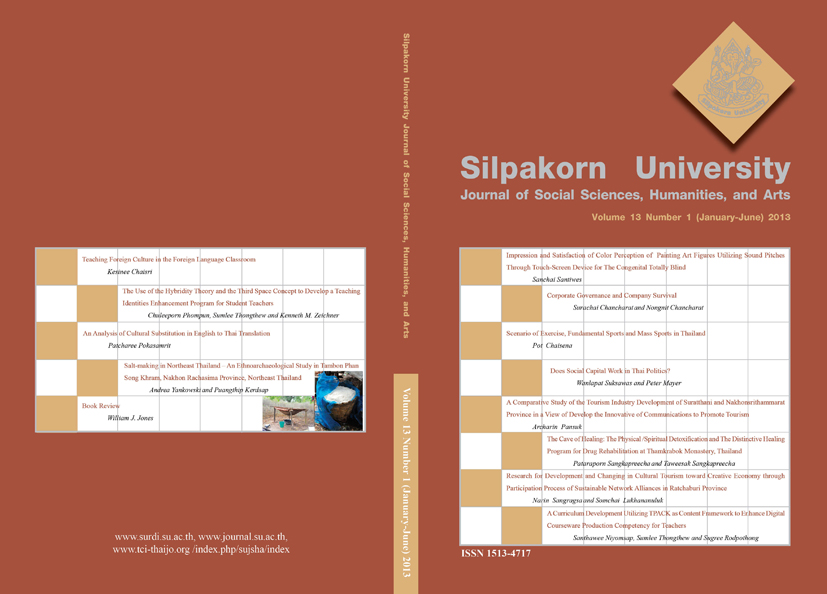The Use of the Hybridity Theory and the Third Space Concept to Develop a Teaching Identities Enhancement Program for Student Teachers
Main Article Content
Abstract
Due to the absence of a linkage between the university and school components of programs, student teachers normally imitate ideas and teaching styles from either their professors or cooperating teachers. Self-development of student teachers in their teaching career is an ability to develop new teaching styles in the third space concept by analyzing all of knowledge that they gained and applying it to a class. Teaching identities can be created from knowledge gained from university professors and from cooperating teachers in school. Therefore, it is very important to develop a program which can enhance teaching identities of student teachers. The purpose of this research was to develop a teaching practicum program for elementary education pre-service teachers based on hybridity theory and the third space concept. There were 10 student teachers majoring in elementary education in Chulalongkorn University, Bangkok, Thailand, participating in this experiment. The sample group was selected using purposive sampling. Professors and cooperating teachers also participated in the training program developed based on the third space concept. Data were collected through participant observation and evaluated by the researcher, professors, and cooperating teachers. It is found that student teachers participated in this program created their teaching identities after all. In addition, the hybridity theory and the third space concept should be adapted to teacher education programs.
Downloads
Article Details
All rights reserved. Apart from citations for the purposes of research, private study, or criticism and review,no part of this publication may be reproduced, stored or transmitted in any other form without prior written permission by the publisher.
References
Bhabha, H. K. (1990) The Third Space: Interview with Homi Bhabha. In J. Rutherford (Ed.), Identity, Community, Culture, Difference. London : Lawrence & Wishart, pp. 207-221.
Bhabha, H. K. (1994) The Location of Culture. London : Routledge.
Bullough, R., Hobbs, S., Kauchak, D., Crow, N., and Stokes, D. (1997) Long-term PDS development in research universities and the clinicalization of teacher education. Journal of Teacher Education, 48(2): 85-93.
Bullough, R., Birrell, J., Young, J., Clark, D., Erickson, L., Earle, R. et al. (1999) Paradise unrealized: Teacher education and the costs and benefits of school-university partnerships. Journal of Teacher Education, 50(5): 381-390.
Cochran-Smith, M. and Lytle, S. (1999) Relationships of knowledge and practice: Teacher learning in Communities. Review of Research in Education, 24: 249-306.
Darling-Hammond, L. (2010) Teacher education and the American future. Journal of Teacher Education, 61(1-2): 35-47.
Gannon, S. (2010) Service learning as a third space in pre-service teacher education. Educational Research, 20(1): 21-28.
Grossman, P. (2005) Pedagogical approaches in teacher education. In M. Cochran-Smith and K. Zeichner. (Eds). Studying Teacher Education.New Jersey: Lawrence Erlbaum, pp. 425-476.
Gutierrez, K. (2008) Developing sociocultural literacy in the third space. Reading Research Quaterly, 43: 148-164.
King, K. P. (2002) Identifying success in online teacher education and professional development. The Internet and Higher Education, 5(3): 231-246.
Levy, R. (2008) “Third spaces” are interesting places; applying “third space theory” to nursery-aged children’ s constructions of themselves as readers. Journal of Early Childhood Literacy, 8(1): 43-66.
Metcalf, K. and Kahlich, P. (1996) Laboratory experiences ad transition from campus to field. In D.J. McIntyre and D. M. Byrd (Eds.) Preparing Tomorrow’s Teachers: The Field Experience. California : Corwin Press, pp. 97-114.
Moje, E., Ciechanowski, K., Kramer, K., Ellis, L., Carrillo, R., and Collazo, T. (2004) Working toward third space in content area literacy: An examination of everyday funds of knowledge and discourse. Reading Research Quarterly, 39(1): 38-70.
Pane, D. (2007) Third space theory: Reconceptualizing content literacy learning. In S. M. Nielsen & M.S. Plakhotnik (Eds.), Proceedings of the Sixth Annual College of Education Research Conference: Urban and International Education Section, 78-83. Miami : Florida International University. [Online URL: www.coeweb.fiu.edu/research_conference/] accessed on June 25, 2011.
Soja, E. (1996) Thirdspace: Journeys to Los Angeles and other Real-and-Imagined Places. Oxford : Blackwell.Tangnamo, S. (2001) Introduction to Understanding the Colonial Ideology.[Online URL: www.midnightuniv.org/midnight2544/newpage11.html] accessed on February 14, 2011.
Thongthew, S. (2011) Teacher training and teacher education in Thailand. International Handbook on Teacher Education Worldwide, 2: 535-552.
Turney, C., Eltis, K., Towler, J., and Wright, R. (1985) A New Basis for Teacher Education: The Practicum Curriculum. Sydney : University of Sydney Press.
Zeichner, K. (2010) Rethinking the Connections Between Campus Courses and Field Experiences in College- and University-Based Teacher Education. Journal of Teacher Education, 61: 89-99.


